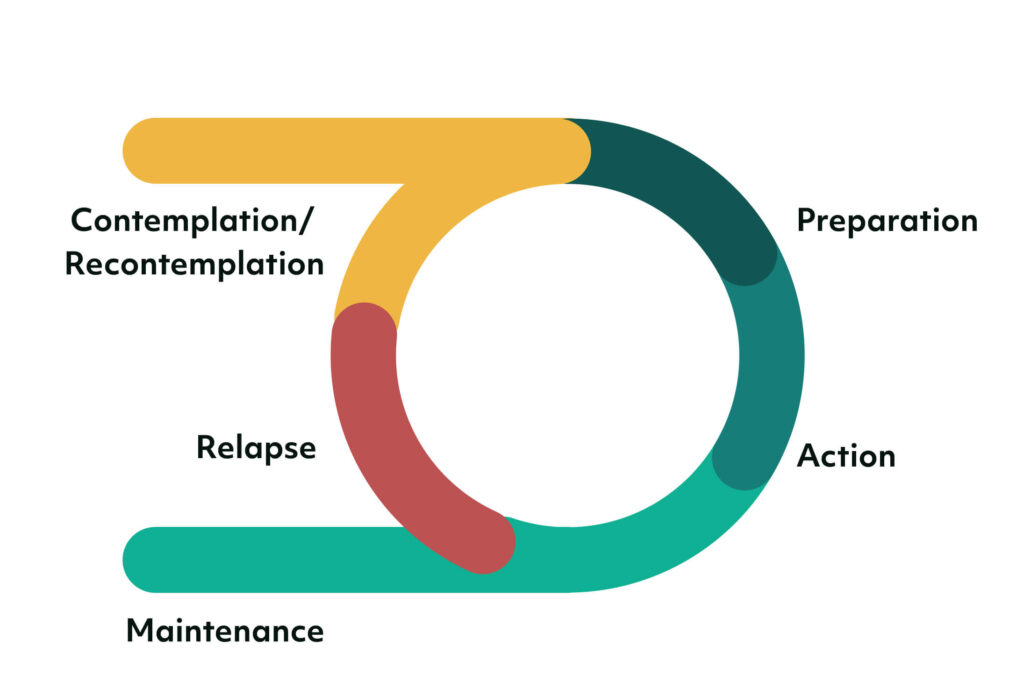It’s common to want recovery to happen all at once, right now. But while that desire is natural, it’s not a very realistic expectation. Recovery is a process of change, and change often happens a little at a time.
Researchers believe that people cycle through a six-stage process of change in our journey to overcome addiction. The fancy, academic name for it is the “transtheoretical model of behavior change.” In the abstract, the process looks like this:
- Pre-contemplation
- Contemplation
- Preparation
- Action
- Maintenance
- Relapse
I say, “in the abstract,” because in real life our process might not go in order from stage 1 to stage 6. For example, a person might jump from contemplation straight into action, then maintenance. Or they might shift back and forth between contemplation and preparation for a long time before moving into action. Some researchers describe this process as a spiral rather than a cycle in recognition of the fact that, for many people, relapse can be part of the process as they move toward long-term recovery.
Pre-contemplation
Have you heard the phrase, “The first step is admitting that you have a problem”? That’s not actually the case. There is a stage that comes before making that admission: becoming aware that a problem with drugs or alcohol exists at all. For example, I spent quite a while convinced that alcohol was the answer to my problems, rather than a major source of them. A lot of us also devote a great deal of energy to denial, refusing to face the consequences of our actions. Some people never move out of this stage—staying in denial over their problem with drugs or alcohol even as their substance use ruins their relationships, health, and well-being. But those of us who do realize that we have a problem can move forward beyond pre-contemplation into another stage.
Contemplation
When a person reaches the contemplation stage, they may be willing to face their use of substances and may even try to moderate and stop. They are willing to learn more about their addictive behavior. However, at this stage they may not yet want to change long-term, or be ready to commit to a treatment program. A person in the contemplation stage may stay in it for days, months, or even years. They may move back to the pre-contemplation stage, or forward to the preparatory stage.
If you have a loved one who seems to be in this stage of change, it can be most helpful when they receive nonjudgmental support and encouragement. Pressure to hurry up and be ready for recovery may result in the person moving back to the pre-contemplation stage.
Preparation
The preparation stage occurs right before the person is ready to take action about their substance use. This is the stage where many of us start taking a lot of online quizzes like, “Are you an alcoholic?” or “Is your drug use becoming a problem?” In this stage, a person might be researching treatment options and trying to figure out how they can get help when they’re ready. They may also start removing triggers from their home, or getting rid of their supply of drugs or alcohol.
If you have a loved one who seems to be in the preparation stage, you can help them look into treatment programs, research cost and insurance coverage, or help them find meetings nearby. You can’t make them be ready, but you can assist them in finding resources.
Action
The action stage is the part we tend to talk about the most. It represents changes in behavior. A person might stop using substances on their own (although a lot of folks who would like to take this route discover that it doesn’t work for them), go to a treatment center, start medication-assisted treatment, attend a mutual-aid meeting (like a 12-step or other recovery program), get honest with a counselor, or check into a medical detox. For some people, the action stage is made of small, positive steps forward, while for others, it is a sudden and major revolution.
If you have a loved one in the action stage, try to support the positive steps they’re taking. This could include helping them remember to take their meds, get to an appointment, or attend a meeting. It’s also important to remember NOT to punish the actions they’re taking by criticizing or judging them for not getting to this stage sooner.
Maintenance
This stage is focused on maintaining the positive behavioral changes. That might mean moving from detox to a treatment center or sober living. Or it could mean creating a routine of recovery supports like meetings, doctor appointments, or therapy. Different people have different recovery goals and needs, so their maintenance stage may not look like everyone else’s. For some folks this stage means taking medication. It can mean abstaining completely or it can mean harm reduction.
Many of the recovery activities we take in the maintenance phase are geared around helping us develop effective and healthy coping skills. This is vital, as most of us previously used substances as a stand-in for coping. Building new skills and strategies helps us avoid relapse.
Relapse
While many of us are able to avoid relapse, it is a common part of the process of recovery. Not everyone who stops will remain stopped. But relapse doesn’t necessarily mean a person is leaving the spiral; a lot of folks who relapse (even more than once) go on to establish long-term recovery.
We have several posts about relapse and getting back on track afterward.
I find this framework helpful for understanding the process of making a decision about getting help and getting into recovery. I hope you do, too. Just remember that in real life, it tends to look a little messier and less ordered than it does when we list out the stages.









